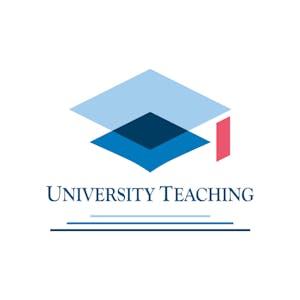University Teaching
University Teaching is an introductory course in teaching and learning in tertiary education, designed by staff at the Centre for the Enhancement of Teaching and Learning at the University of Hong Kong. With input from instructors, guests and interviewees, including teaching award winners, students, and experts in the fields, you will be exposed to research evidence in relation to effective university teaching and practical instructional design strategies. You will also be …
University Teaching
University Teaching is an introductory course in teaching and learning in tertiary education, designed by staff at the Centre for the Enhancement of Teaching and Learning at the University of Hong Kong. With input from instructors, guests and interviewees, including teaching award winners, students, and experts in the fields, you will be exposed to research evidence in relation to effective university teaching and practical instructional design strategies. You will also be exposed to multiple examples of effective teaching, and hear the views of teachers whose teaching has been judged to be excellent.
More specifically, University Teaching will help you to address the following questions:
- What does teaching in higher education involve?
- What does research evidence tell us about effective teaching in higher education?
- How can we ensure that our instructional design will help our students achieve their intended learning outcomes?
- What pedagogic options do we have to make our teaching successful?
- What assessment and feedback practices can help our students learn more effectively?
After completing the learning tasks in this course, you will be able to:
- Discuss the teaching and learning context in higher education and reflect on the potential challenges and opportunities you might encounter.
- Explain key teaching and learning concepts and relevant evidence in relation to effective university teaching.
- Analyse the relationships between various aspects of teaching and student learning.
- Identify a range of instructional strategies to support effective student learning.
- Apply key concepts to the structuring of course outlines and lesson plans in order to create learning experiences to support successful student learning.
Course trailer: https://www.youtube.com/watch?v=ZJu-dViz3NE Course outline: http://www.cetl.hku.hk/wp-content/uploads/2017/03/CETL-MOOC-course-outline.pdf
None
Syllabus
Syllabus - What you will learn from this course
Week 1
Course Introduction
What does it look like teaching in higher education?
Week 2
What does research tell us about effective teaching in higher education?
Week 3
How shall we go about curriculum and instructional design?
Week 4
What pedagogical options can we find from successful examples? – An instructional toolbox
Week 5
How to design effective assessment?
Week 6
How to provide constructive and high-impact feedback?
FAQ
When will I have access to the lectures and assignments?
Access to lectures and assignments depends on your type of enrollment. If you take a course in audit mode, you will be able to see most course materials for free. To access graded assignments and to earn a Certificate, you will need to purchase the Certificate experience, during or after your audit. If you don't see the audit option:
What will I get if I purchase the Certificate?
When you purchase a Certificate you get access to all course materials, including graded assignments. Upon completing the course, your electronic Certificate will be added to your Accomplishments page - from there, you can print your Certificate or add it to your LinkedIn profile. If you only want to read and view the course content, you can audit the course for free.
Is financial aid available?
Yes. In select learning programs, you can apply for financial aid or a scholarship if you can’t afford the enrollment fee. If fin aid or scholarship is available for your learning program selection, you’ll find a link to apply on the description page.
What is in this course?
The course will help you to address the following questions:
- What does teaching in higher education involve?
- What does research evidence tell us about effective teaching in higher education?
- How can we ensure that our instructional design will help our students achieve their intended learning outcomes?
- What pedagogic options do we have to make our teaching successful?
- What assessment and feedback practices can help our students learn more effectively?
Is this course for me?
If you are thinking about becoming an academic teacher, or you have just got an academic teaching post, or you just have an interest in understanding the essentials of university teaching, this course is for you.
How can I get a Course Certificate and what is it?
You can earn official recognition for the course you take on Coursera with a Course Certificate for completing and passing course assignments and meeting the assessment standards. Please refer to details on: https://www.coursera.org/signature/
How can I apply for Financial Aid?
Coursera offers Financial Aid for learners who cannot afford to pay for courses they would benefit from. Learners with Financial Aid in a course will be able to access all of the course content and complete all work required to earn a Course Certificate. Please refer to details on: https://learner.coursera.help/hc/en-us/articles/209819033-Apply-for-Financial-Aid
Reviews
It is a wonderful learning experience useful and a very much informative course. Thank you all for tireless
effort makes it easier to understand the university teaching course.
Great content! Well researched! Great Facilitators! Thank you. The course has a logical progression. Well organised and crisp. Thank you
Really good with real world examples supported by research. I was very pleased with the course and would recommend it to anyone starting teaching at a university.
An excellent eye-opener, especially in this current situation and aspects are equally applicable to offline teaching too.
Sincere thanks to the team.
Start your Free Trial
Self paced
22,990 already enrolled
4.8stars Rating out of 5 (1,052 ratings in Coursera)
Go to the Course
